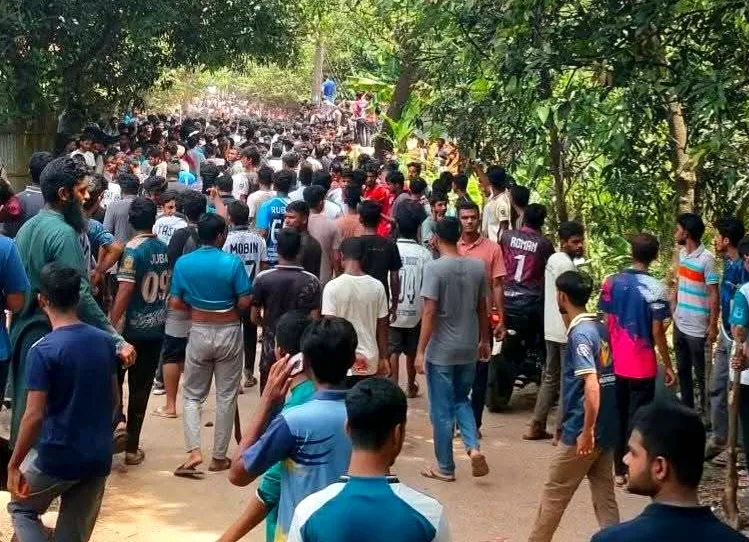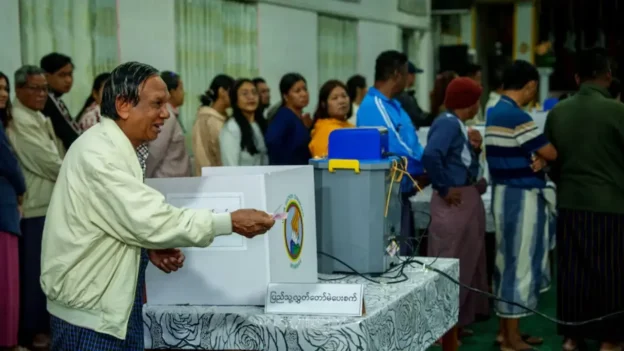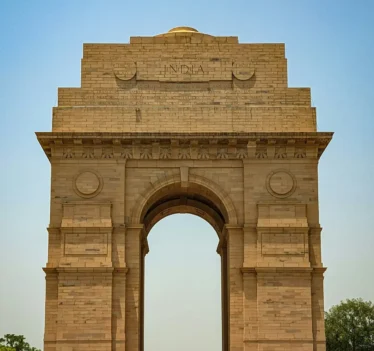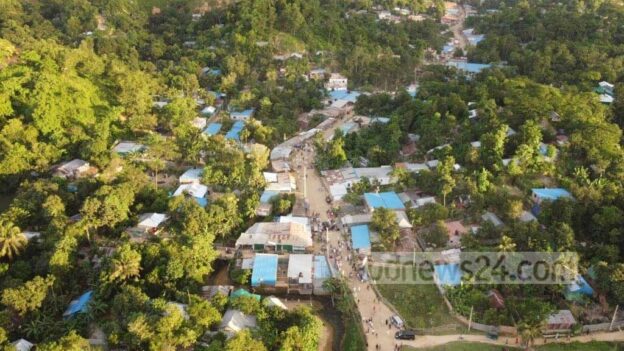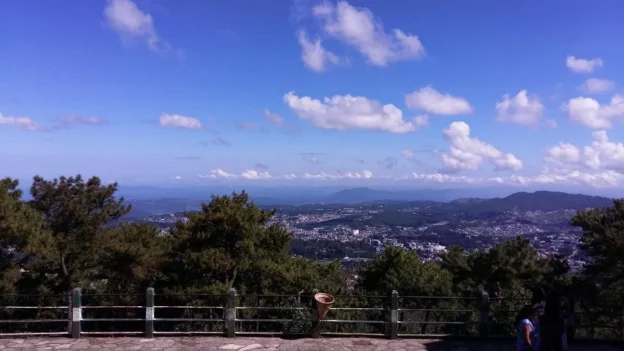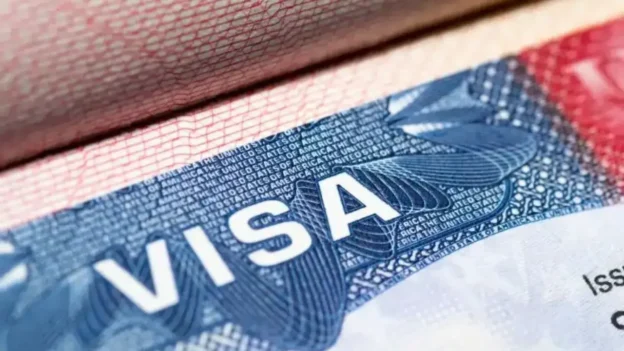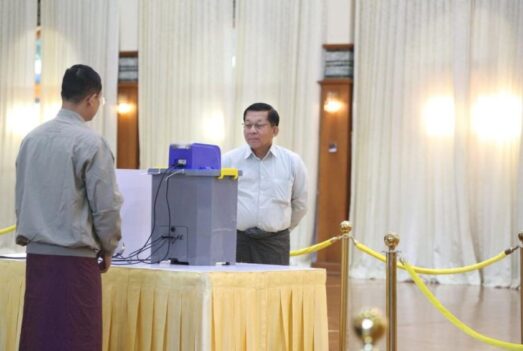The streets of Jobra, a village once synonymous with Muhammad Yunus’s microcredit experiment, became a battlefield on Sunday as residents clashed violently with Chittagong University students, leaving hundreds injured and laying bare the profound erosion of public trust in Bangladesh’s student leaders.
The melee, marked by volleys of brickbats, sharp weapons, and chaotic chases, was the second major outbreak of violence in as many days.
By late afternoon, Chattogram Medical College Hospital had become a tableau of trauma — corridors choked with stretchers, students staggering in with fractured limbs, bloodied heads, and mutilated hands.
University officials said 300 to 400 students and several teachers had been injured.
But amid the carnage, villagers expressed neither sympathy nor regret. Instead, they voiced a crescendo of anger toward the once-revered student activists who spearheaded the July 2024 uprising that toppled former Prime Minister Sheikh Hasina.
“These so-called students are intoxicated by hubris and impunity.” said Abdul Karim, a Jobra shopkeeper.
“They masqueraded as liberators, but in truth they are vandals and extortionists. They promised emancipation but delivered mayhem. They are eviscerating the soul of this nation.”
Another villager, a mother of three, echoed the sentiment:
“We entrusted them with our hopes. Now we see only fanatics obsessed with domination. The uprising was not a renaissance but a descent into barbarism. They have betrayed us, and we will resist them.”

Only a year ago, students were lionized as the vanguard of democracy, galvanizing mass protests that culminated in Hasina’s resignation after more than a decade in power.
Their victory was heralded as an inflection point — a supposed rebirth of Bangladesh’s democratic aspirations.
That aura has evaporated with astonishing rapidity.
On July 26, several uprising leaders were arrested on allegations of demanding Tk 50 lakh in extortion from former lawmaker Shammi Ahmed at her Gulshan residence.
In May, police detained 14 members of the Anti-Discrimination Student Movement for allegedly attacking a business establishment in Dhaka’s Kalabagan area.
For many Bangladeshis, these scandals confirmed a metastasis: idealism had ossified into opportunism, and activism had curdled into criminality.
“They toppled one autocrat only to enthrone themselves as petty despots,” said a Jobra elder. “Their revolution was counterfeit — a chimera. They have squandered the people’s faith.”
The crisis is compounded by the unelected interim government led by Yunus, which villagers and analysts alike describe as a regime of expediency sustained by the military and Islamist factions.
Critics say secular and pro-liberation groups are persecuted, while convicted militants are exonerated and even lionized.
Human Rights Watch has warned of “an alarming surge in mob violence, political violence, and harassment of journalists,” pointing to an environment in which religious hardliners dictate public morality, women are harassed, and minorities face unrelenting assaults.
The scale of desecration has shocked even seasoned observers. In August 2024, attackers razed 600 sculptures at the Mujibnagar Memorial Complex in Meherpur, obliterating tributes to the 1971 Liberation War.

On February 5, 2025, a pro-Yunus mob demolished the Bangabandhu Memorial Museum — Sheikh Mujibur Rahman’s residence — while security forces abstained from intervention.
Minority persecution has intensified: more than 2,500 incidents in the past year include murder, sexual harassment, arson, and vandalism.
In Rangpur in July, mobs demolished a dozen Hindu homes. Meanwhile, Khulna University authorities ordered dormitories renamed to expunge references to Hindu freedom fighters and Sufi saints — a move seen as capitulation to Islamist demands.
“They are desecrating our history, demolishing our sanctuaries, and legitimizing fanaticism,” said another Jobra villager. “This is not governance — it is desecration.”
Allegations of venality within the Yunus administration have further corroded its credibility.
Yunus is accused of securing tax exemptions worth at least $66 million for Grameen Bank, licensing a manpower export company, launching a private university, and annulling legal cases against him without judicial scrutiny.
He has also faced accusations of nepotism for appointing his nephew as deputy press secretary to the Chief Adviser.
His advisers have courted notoriety.
Asif Mohammad Sajib Bhuyan, a student-turned-official, drew outrage for flying by helicopter just 17 kilometres, then was caught at Dhaka airport carrying illegal ammunition.
He allegedly used his office to secure trade licenses for his father, a government employee accused of land grabs and even murder. Another adviser, Mahfuz Alam, faces allegations of money laundering.

Despite these revelations, no punitive action has been taken, reinforcing perceptions of impunity.
“The regime promised probity,” said a Dhaka-based analyst. “Instead it has institutionalized graft, nepotism, and duplicity.”
Beyond political turbulence, the economy hovers precariously at the edge of a meltdown.
Prominent industrialist AK Azad warned that exports are experiencing their worst downturn in four decades.
Former central bank economist Biru Paksha Paul described the economic trajectory as perilous, while the Asian Development Bank has sounded alarms over structural vulnerabilities.
Factories have shuttered, unemployment has soared, and inflation has eviscerated household savings. The public mood oscillates between despondency and rage.
“People are hungry, jobless, unsafe,” said one Md Jashim, local of Chittagong town. “They promised us dignity, but gave us destitution.”
What remains is a volatile amalgam of grievance and despair.
Mob justice proliferates, secularism is under siege, and democratic norms appear increasingly anachronistic.
The interim regime’s opaque negotiations with foreign powers — including a proposed undisclosed business deal with the United States — have stoked fears that sovereignty is being bartered away.
Analysts warn the situation resembles a “low-intensity civil war,” with factional violence metastasizing into national instability.
This uprising has devolved into anarchy,” said a school teacher seeking anonymity. “The students who once inspired us now imperil us. Yunus clings to power without mandate, and the nation is disintegrating.”
Calls are mounting for Yunus to step aside and allow a transitional authority to organise elections within months.
Critics argue his tenure has proven he harbours his own political ambitions rather than a commitment to democratic renewal.
“They have corroded our faith, desecrated our history, and endangered our future,” said Karim, the shopkeeper.
“Enough. We will not be ruled by students intoxicated with fanaticism or by a regime sustained by deception. The time has come for this masquerade to end.”

